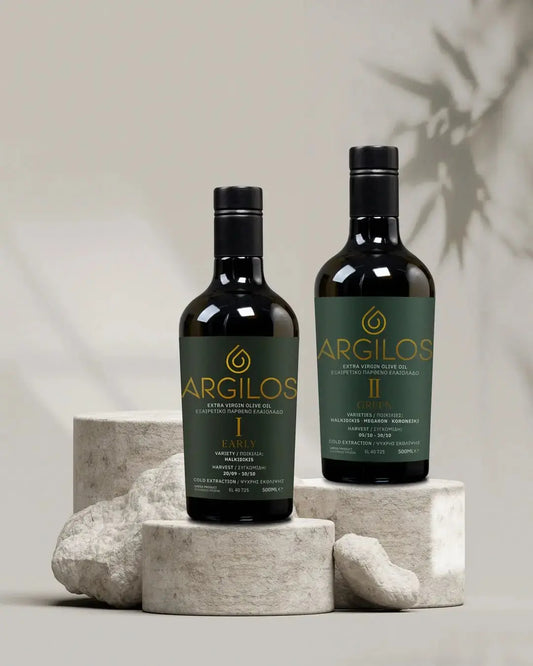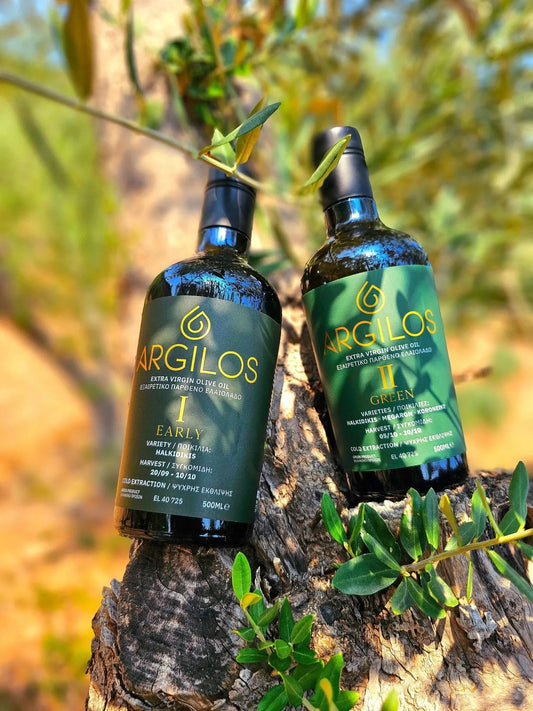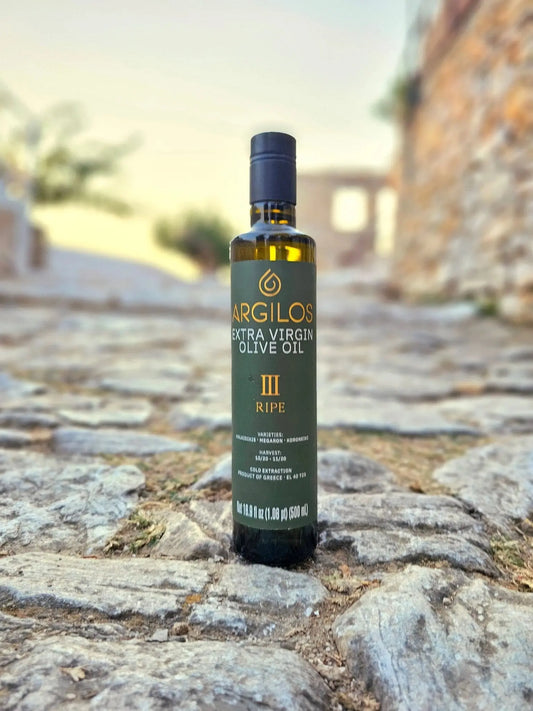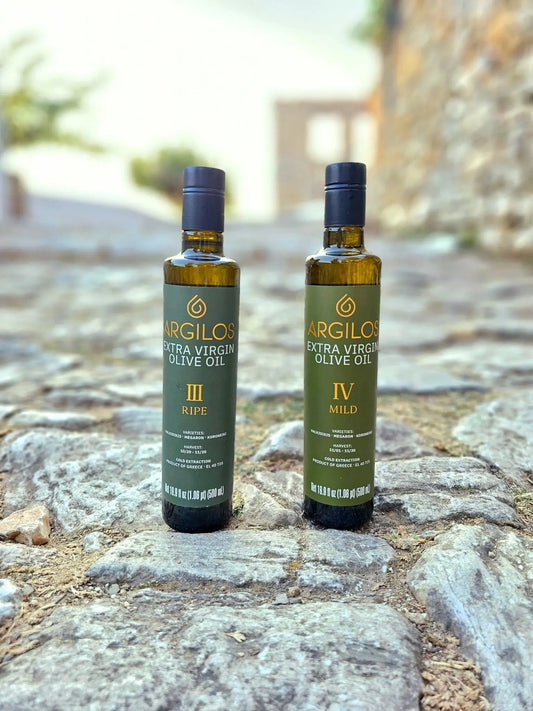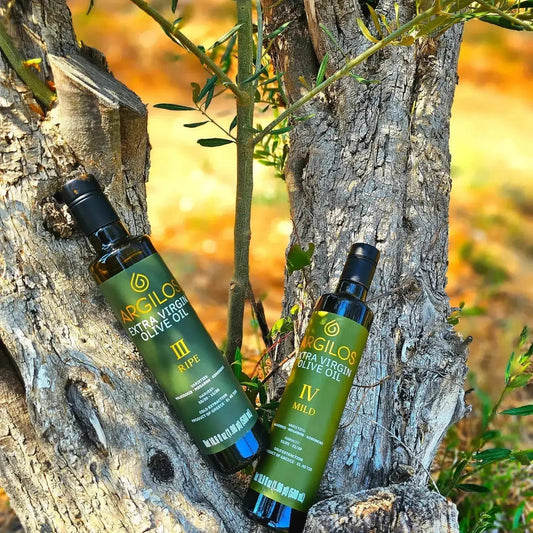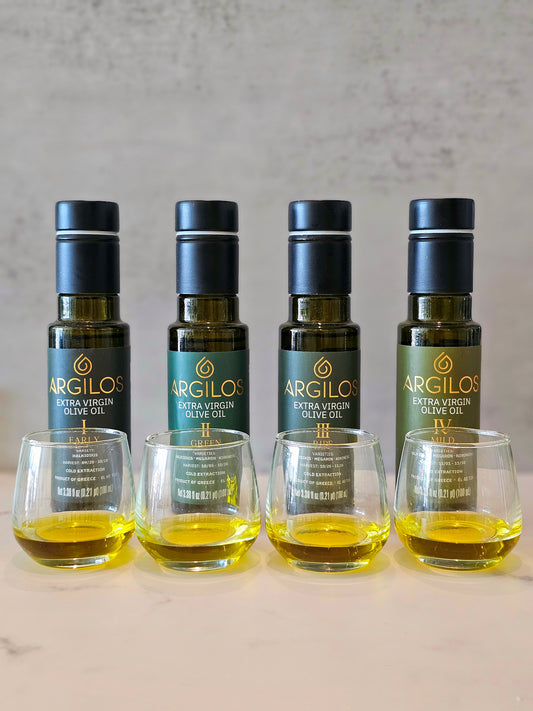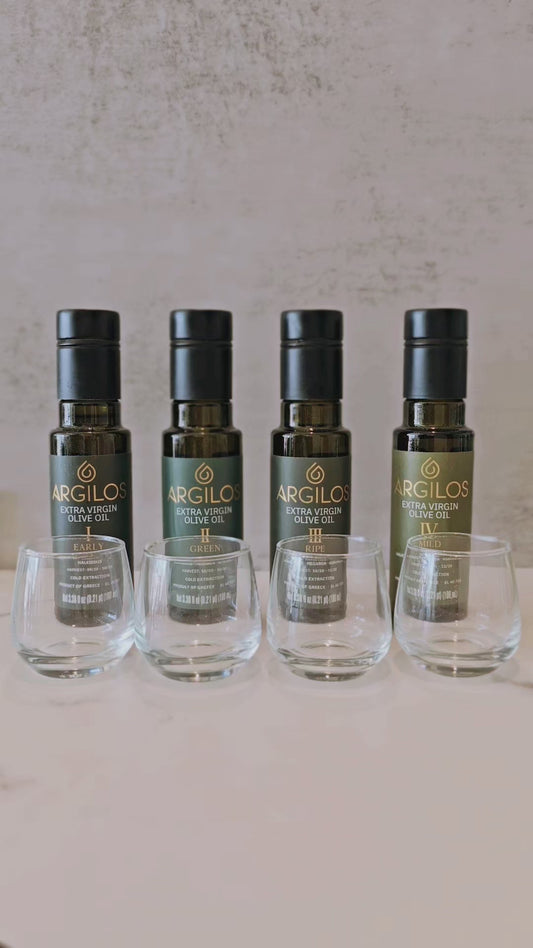Google's Most Searched Olive Oil Questions Answered by An EVOO Expert
Your comprehensive guide to understanding extra virgin olive oil

Olive oil is one of the most searched culinary topics on Google, and for good reason. As an EVOO expert, I'm here to answer the most common questions about extra virgin olive oil, from storage to health benefits. Whether you're a cooking enthusiast or just starting your olive oil journey, this guide will help you make informed choices.
What is the difference between olive oil and extra virgin olive oil?
Extra virgin olive oil (EVOO) is the highest quality olive oil available. It's made from pure, cold-pressed olives without any chemical processing or heat treatment. To qualify as extra virgin, the oil must have:
- An acidity level below 0.8%
- Superior taste with no defects
- Extraction through mechanical means only
Regular olive oil, on the other hand, is a blend of refined olive oil and virgin olive oil. It undergoes chemical processing to remove defects and has a more neutral flavor. While it's still useful for cooking, it lacks the robust flavor and health benefits of EVOO.
Greek extra virgin olive oil, particularly from regions like Kalamata and Crete, is renowned for its exceptional quality due to ideal growing conditions and traditional harvesting methods.
How should I store olive oil to keep it fresh?
Proper storage is crucial for maintaining the quality and flavor of your extra virgin olive oil. Follow these expert tips:
- Keep it dark: Store in a dark glass bottle or tin to protect from light exposure
- Cool temperature: Maintain between 57-70°F (14-21°C), away from heat sources
- Seal tightly: Always close the cap immediately after use to minimize oxygen exposure
- Use within 18 months: EVOO is best consumed within 12-18 months of harvest date
Never store olive oil near the stove or in direct sunlight. Heat and light are the enemies of quality olive oil, causing it to oxidize and lose its beneficial properties and flavor profile.
Did You Know?
Greece produces approximately 300,000 tons of olive oil annually, with over 80% classified as extra virgin—the highest percentage of any olive oil-producing country in the world. The country has over 130 million olive trees, many of which are centuries old.
Can you cook with extra virgin olive oil at high temperatures?
Yes! This is one of the most common misconceptions about EVOO. Extra virgin olive oil is excellent for cooking at high temperatures.
EVOO has a smoke point of approximately 375-410°F (190-210°C), which is suitable for most cooking methods including:
- Sautéing and pan-frying
- Roasting vegetables
- Baking
- Light stir-frying
High-quality EVOO contains antioxidants and polyphenols that make it more stable than many other cooking oils. Greek extra virgin olive oil, with its high polyphenol content, is particularly resistant to oxidation during cooking.
The key is to avoid heating any oil past its smoke point, where it begins to break down and produce harmful compounds.
What are the health benefits of extra virgin olive oil?
Extra virgin olive oil is a cornerstone of the Mediterranean diet and offers numerous scientifically-proven health benefits:
- Heart health: Rich in monounsaturated fats that help reduce bad cholesterol (LDL) and increase good cholesterol (HDL)
- Anti-inflammatory properties: Contains oleocanthal, a natural anti-inflammatory compound
- Antioxidant power: Packed with polyphenols that fight oxidative stress and cellular damage
- Brain health: May help protect against cognitive decline and Alzheimer's disease
- Blood sugar regulation: Can improve insulin sensitivity and help manage diabetes
The highest quality Greek EVOO contains exceptional levels of these beneficial compounds, making it not just a cooking ingredient but a functional food for optimal health.
How can I tell if olive oil is high quality?
Identifying high-quality extra virgin olive oil requires attention to several key factors:
Look for these indicators:
- Harvest date: Should be clearly labeled (not just bottling date)
- Dark bottle: Quality EVOO comes in dark glass or tin to protect from light
- Origin: Single-origin oils from reputable regions like Greece, Italy, or Spain
- Certifications: PDO (Protected Designation of Origin) or organic certifications
- Taste: Should have a fresh, fruity flavor with peppery or bitter notes
Sensory evaluation:
Quality EVOO should smell fresh and fruity, never musty or rancid. When tasted, it should have complexity with a pleasant bitterness and a peppery finish that may cause a slight throat tickle—this indicates high polyphenol content.
The Polyphenol Advantage
Premium Greek EVOO can contain up to 500mg of polyphenols per kilogram, compared to the minimum requirement of just 100mg/kg for extra virgin classification. These powerful antioxidants are responsible for the peppery sensation in your throat and provide significant anti-inflammatory benefits.
Why is Greek extra virgin olive oil considered superior?
Greek extra virgin olive oil has earned its reputation as some of the world's finest for several compelling reasons:
Ideal growing conditions: Greece's Mediterranean climate, with abundant sunshine and mineral-rich soil, creates perfect conditions for olive cultivation. The country has been producing olive oil for over 4,000 years.
Traditional methods: Many Greek producers still use time-honored harvesting and pressing techniques that preserve the oil's natural qualities and flavor profile.
High polyphenol content: Greek EVOO, particularly from varieties like Koroneiki, contains exceptionally high levels of polyphenols—often 2-3 times higher than other origins. These compounds provide both health benefits and superior flavor.
Low acidity: Premium Greek EVOO typically has acidity levels well below the 0.8% maximum for extra virgin classification, often as low as 0.2-0.3%.
Unique flavor profiles: From the robust, peppery oils of Crete to the delicate, fruity oils of the Peloponnese, Greek EVOO offers diverse and distinctive taste experiences.
Does olive oil expire or go bad?
Yes, olive oil does expire and can go rancid over time. Unlike wine, olive oil does not improve with age—it's best enjoyed fresh.
Signs of rancid olive oil:
- Musty or stale smell (like crayons or putty)
- Greasy or waxy mouthfeel
- Flat, bland, or unpleasant taste
- Loss of the characteristic peppery or fruity notes
Shelf life guidelines:
- Unopened: 18-24 months from harvest date
- Opened: 3-6 months when stored properly
- Best quality: Within 12 months of harvest
Always check the harvest date (not just the best-by date) when purchasing EVOO. Greek producers who are confident in their quality will prominently display the harvest date on the bottle.
What does 'cold-pressed' and 'first cold-pressed' mean?
Cold-pressed means the olives were pressed at temperatures below 80.6°F (27°C). This gentle extraction method preserves the oil's delicate flavors, aromas, and nutritional compounds that would be damaged by heat.
First cold-pressed is actually a somewhat outdated term from when olives were pressed multiple times. Modern production methods use centrifugation, making multiple pressings unnecessary. Today, all authentic extra virgin olive oil is essentially 'first pressed.'
What matters more:
- Extraction time: The faster olives are pressed after harvest (ideally within 24 hours), the better the quality
- Mechanical extraction only: No chemical solvents or heat should be used
- Single estate or single origin: Indicates traceability and quality control
Greek EVOO producers often harvest and press within hours, ensuring maximum freshness and flavor retention.
Ancient Olive Trees
Some olive trees in Greece are over 2,000 years old and still producing fruit. The oldest known olive tree in the world is located in Crete and is estimated to be between 2,000-3,000 years old. These ancient trees produce olives with incredibly concentrated flavors and nutrients.
What are the different olive oil varieties and flavor profiles?
Just like wine grapes, different olive varieties produce distinct flavor profiles. Understanding these can help you choose the right oil for different culinary applications.
Greek varieties:
- Koroneiki: The most common Greek variety, producing a robust, peppery oil with high polyphenol content. Ideal for drizzling and dipping.
- Manaki: Milder and sweeter with fruity notes. Perfect for delicate dishes and baking.
- Tsounati: Medium intensity with herbal and grassy notes. Excellent all-purpose oil.
Flavor categories:
- Robust: Intense, peppery, bitter notes—best for hearty dishes, grilled meats, and bold flavors
- Medium: Balanced fruitiness with moderate pepper—versatile for most cooking applications
- Delicate: Mild, buttery, subtle—ideal for baking, fish, and light vegetables
Greek EVOO tends toward the robust end of the spectrum, offering bold flavors that stand up to Mediterranean cuisine.
How much olive oil should I consume daily for health benefits?
Research on the Mediterranean diet suggests that 2-4 tablespoons (30-60ml) of extra virgin olive oil per day can provide significant health benefits.
Health benefits at this intake level:
- Reduced risk of cardiovascular disease
- Lower inflammation markers
- Improved cholesterol levels
- Better blood sugar control
- Enhanced cognitive function
How to incorporate it:
- Drizzle over salads and vegetables
- Use as a bread dip instead of butter
- Add to smoothies (yes, really!)
- Use for cooking and sautéing
- Take a tablespoon straight in the morning (traditional Greek practice)
Remember, EVOO is calorie-dense (about 120 calories per tablespoon), so it should replace other fats in your diet rather than being added on top of your normal intake.
Is expensive olive oil worth it?
The short answer: Yes, when you're buying authentic, high-quality EVOO.
Here's what you're paying for with premium olive oil:
- Quality olives: Hand-picked at optimal ripeness, not mechanically harvested
- Immediate processing: Pressed within hours of harvest, not days
- Small-batch production: Careful attention to every step of the process
- Higher polyphenol content: More health benefits and better flavor
- Traceability: Single estate or single origin with transparent sourcing
- Proper storage: Dark bottles, nitrogen flushing, temperature control
Price guidelines:
Authentic extra virgin olive oil typically costs $15-40 per 500ml bottle. If you see EVOO for $5-8 per liter, it's likely not authentic or has been sitting on shelves for too long.
Greek EVOO offers exceptional value—you're getting premium quality at competitive prices because Greece produces such high percentages of extra virgin grade oil.
Can I use olive oil for skin and hair care?
Absolutely! Extra virgin olive oil has been used for beauty and skincare for thousands of years, particularly in Mediterranean cultures.
Skin benefits:
- Deep moisturization: Rich in vitamin E and fatty acids that nourish dry skin
- Anti-aging properties: Antioxidants help fight free radicals and reduce signs of aging
- Gentle makeup remover: Effectively dissolves makeup without harsh chemicals
- Healing properties: Can help soothe minor irritations and promote skin repair
Hair benefits:
- Deep conditioning: Penetrates hair shaft to repair damage
- Scalp health: Moisturizes dry scalp and may help with dandruff
- Shine and softness: Smooths hair cuticle for glossy, manageable hair
How to use:
For skin: Apply a small amount to damp skin after showering. For hair: Use as a pre-shampoo treatment, applying to dry hair and leaving for 30 minutes before washing.
Use high-quality, fresh EVOO for topical applications—the same antioxidants that benefit your health internally also work externally.
Experience Authentic Greek Extra Virgin Olive Oil
Now that you understand what makes exceptional olive oil, it's time to experience it for yourself. Our Greek extra virgin olive oil is cold-pressed from hand-picked olives, delivering the authentic flavors and health benefits you deserve. Each bottle represents centuries of tradition and the perfect Mediterranean terroir.

